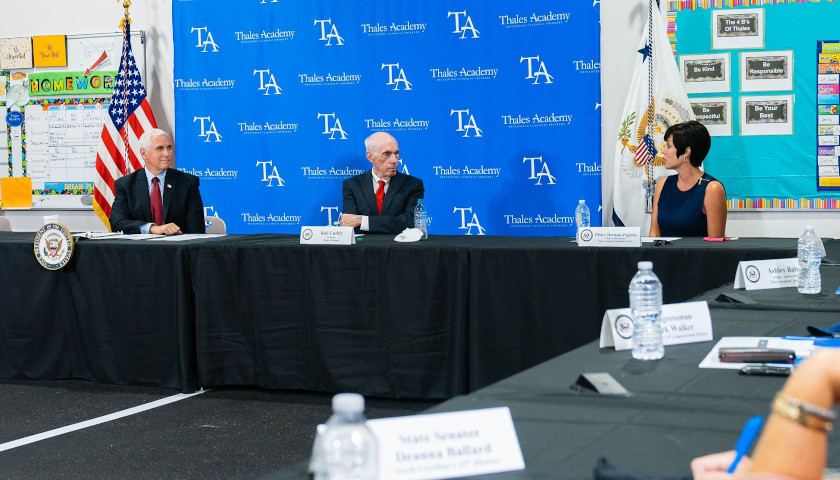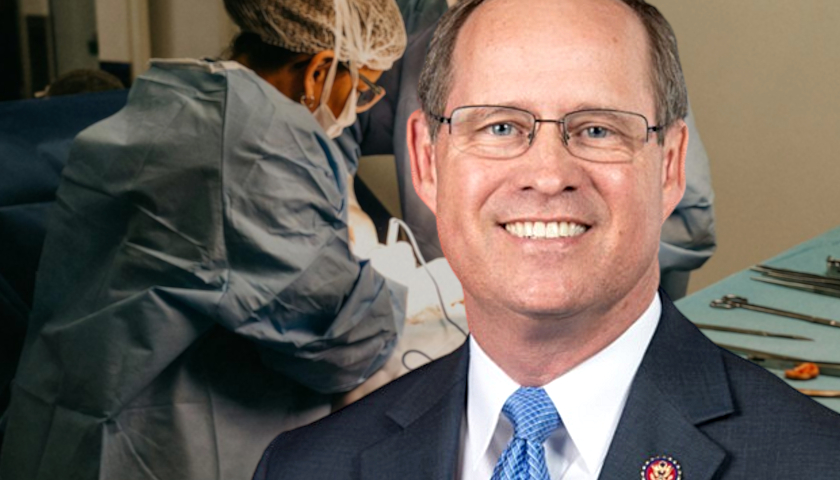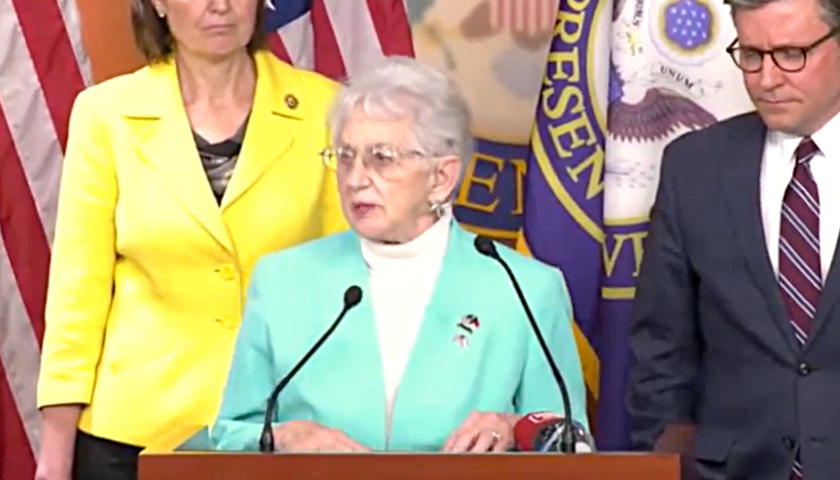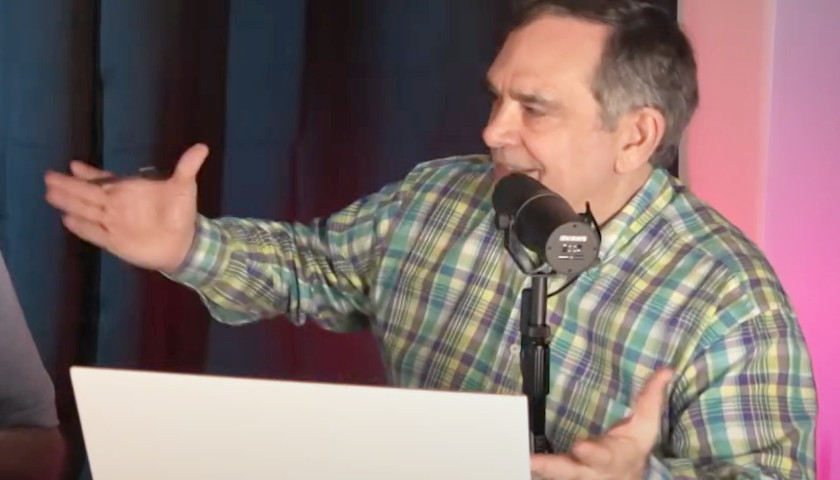Here is a transcript of what Vice President Mike Pence said while participating in a roundtable discussion on Wednesday talking about how to reopen schools safely.
Pence: Thank you Bob Luddy and the great team here at Thales Academy. Thank you again for the hospitality. Thank you for your example. Thank you for proving that even through all of the days through which we’ve passed and the sacrifices that all of us have made that we can continue to open up North Carolina again. And also open up North Carolina’s schools in a safe and responsible way. So thank you all very very much. It’s an honor to be with you. With that, I’d be happy to turn it over to the Secretary of Education for her remarks. And then I’d love to hear more about the great great efforts here at Thales Academy.
Luddy: Thank you, Mr. Vice President.
DeVos: Thank you first of all. (Applause) Mr. Vice President thank you so much for helping draw attention to the imperative of getting kids back to school. Your leadership and the president’s leadership on this is so important and I’m so grateful to have your focus on this and I know I join the education leaders here from Apex Academy here by saying thank you.
Thank you for thinking about the kids and their futures. And a special thanks to Bob Luddy for your visionary leadership and for really providing opportunities for kids who need it most. It’s just a pleasure to be able to visit one of your schools here and to see students back in the classroom again.
It’s thrilling to know that all eight of your campuses are open again. I think if I have my numbers right there are about 3,500 students between the eight campuses that are all back in school learning. It’s really great to hear about your year-round model too and the shutdown situation in the spring now you are back in July with kids that have missed that opportunity in the spring that are now back together and picking up right where they left off.
And that’s really a very commendable thing. And frankly what a lot of other schools should be thinking about. We know that the summer slide is certainly a reality. And you are addressing that in a very very upfront and creative way. The vice president and I are here today because we believe every student in North Carolina and across America must get back to school.
So it’s not a matter of if schools reopen its a matter of how they do so safely. And how schools reopen is best left to local leaders because they know their students, their teachers, and the health situations in their specific areas. There is not a national superintendent nor should there be.
Therefore there is not a national plan for reopening. Education is perhaps the most local issue there is. And Thales is a great example more schools could emulate. You didn’t wait for guidance from the Department of Education. You didn’t ask for permission.
Your families wanted kids back in school. You wanted kids back in school. Teachers wanted to be back in school. And so you figured out ways to do it and to do it safely. And I know if the situation requires it for families that really need it or request it you offer a robust and fully functional remote and distance learning plan for students who are in unique situations.
More education leaders here in North Carolina can pivot as well and do it well and do what’s right for all students. There are too many schools in this state and others that are ignoring parents and students in keeping schools closed. Giving families essentially no choice but to fall back on virtual learning which we know for all too many students simply doesn’t work.
Ultimately all of education needs to rise and meet the needs of each and every student. And students and their families shouldn’t have to conform to a one size fits all approach. And parents and kids can’t be held captive to others’ fears or agendas.
Students and their parents deserve choices to go somewhere else if their school is falling short or if it doesn’t’ work for them. And the tax dollars meant to support their child’s education should go with them. Education needs to rise and meet the need of each and every student.
It can’t be said enough. Students and their families again should not have to conform to a one size fits all approach. For more than three decades I’ve talked about the need to rethink education. And to expand education options for all students. It’s a passion the president and the vice president share. This moment really welcomes it.
It frankly demands it. Students need it. Families are demanding it and teachers need it. So we’re working with Congress right now to ensure that students and especially the most vulnerable have the options and the resources and the freedom needed to keep learning this fall at the places and in the ways that make the most sense for them and work for them.
Families here recently won the hard-fought freedom to use the education savings account in addition to the voucher programs that serve nearly 14,000 students in North Carolina. I would also like to note that today that we are announcing the Department of Education our Rethink Education Model Grant as part of the CARES Act that North Carolina will be the winner and recipient of. There is more good news for students in North Carolina as a result.
But still, there is great demand and more parents calling for more mechanisms of school choice now. Senator Tim Scott recently took a bold step towards answering that call. He grew up in a single-parent household in a forgotten community.
He knows that students like him all over our country need access to more educational opportunities. Senator Scott’s School Choice Now Act must be part of any relief package to help all students return safely to school this fall. Education funding should ultimately be about the students and go with the students no matter the school setting.
And certainly, if a student’s assigned school refuses to open this fall and forces families to learn remotely with no other option families should have the option to take the funding set aside for their child’s education to find an alternative that will educate their child full time.
Congress should seize this real and important opportunity to expand and offer all education options at all schools and to all students across America. There are silver linings to this virus and its results and implications. We just need to look for them.
And in the case of students look for doing what’s right to meet the needs of each and every student across the country. Again thanks to Bob Luddy for your leadership here in North Carolina and other states and for giving us an example of what can be. And giving us the opportunity to visit you here today and see the great job that you are doing. Thank you so much.
(Applause)
Luddy: Thank you very much, Secretary DeVos. The first question and comment will go to Hillary Herman and it will be related to, can you tell us the challenges of opening school and keeping them safe this year?
Herman: One of the biggest challenges has been being flexible. Especially being a school that really thrives on using every moment of our school day for academics. We’ve really had to shift our thinking and shift the thinking of our teachers to focus more on taking the time to do the sanitation measures that we’ve put in place.
And so that’s been the number one challenge of just being flexible and understanding that it’s not going to look the same and being ok with that. Because we can still really provide high-quality experiences for our kids and keep them safe. We just need to sanitize frequently. Reinforce all of those good hygiene behaviors. And take some additional measures in our classrooms and in our schools.
Luddy: Thank you.
Pence: I heard the kids talk about it.
Herman: Yes.
Pence: Arm’s length hands down. Then they know they are going to be far enough apart. Is that right?
Herman: Yes.
Pence: The kids understand it’s going to be different. It’s not going to be the same but it’s going to be school.
Herman: Absolutely. There are a lot of things the same here for the kids it’s just different procedures for the most part and retraining them on things they’ve been previously trained on. Things like walking in a line look different. Things like arrival and dismissal time look very different to the kids.
They start their day getting a temperature check. That’s different for them. We are used to it. Parents are completing daily health screenings for students as well. So it really takes a village also. You have to have the support of the parents, the teachers, the administration, and Mr. Luddy has been a huge support for all of us in making this happen.
Pence: Great job.
Luddy: The same question to Miss Ashley for the Roseville Thales 6th through 12 school.
Miss Ashley: Working with the older students they are more independent and can understand what’s going on but we’ve had to teach to be a problem solver. So while the school day does look different in terms of routines and procedures to prevent the spread of germs. Whether it’s going down a one-way hallway it’s retraining those different routines and having them understand the why behind it.
At the upper-grade levels they are extremely helpful. They enjoy technology and they enjoy technology in the classroom but they are also social beings that want to see their friends. They want to collaborate. So we just have to figure out how to do that safely and think outside the box on solutions.
Pence: That’s great. It’s different for my wife who is an art teacher. She now has a cart. She’s not going to have an art classroom where the children usually come to the classroom. She’ll come to the classroom. You see teachers adjusting around that? The kids are adjusting around that?
Miss Ashley: (Inaudible talk) and look for areas that we could have either teacher travel or students travel differently. Wearing masks. Different conversations. As long as the students understand why and how to do that they are just happy to be back in the building.
Pence: Yes. I can tell. I can tell. I really could.
Luddy: Could you talk about the importance of having new school instruction?
Herman: I think first and foremost being able to see and understand what’s happening while students are learning and certainly with our direct instruction model. So much of what we do depends on what’s immediately happening. How they are responding. Their level of engagement.
That gets a little bit more challenging when you try to implement it in a virtual model. I feel that our virtual model has been a robust and successful model. We’re better able to gauge where students are and assess their learning and meet their needs by having them right in front of us. And just in general for their well being it’s pretty amazing to walk around the schools right now.
And just feel the vibe of happiness among the students. Some times you have kids that they don’t want to wake up in the morning and go to school but you know they are happy to be here and so they are willing to engage in those learning opportunities just to get to be here.
Pence: Great.
Luddy: Ashley, same question.
Miss Ashley: I think we also had an obligation to our families. We have a lot of working families where it was hard to juggle working at home and trying to be a teacher. And we just felt the obligation of if we were going to come but how are we going to come back and how do we meet the needs of the families we were serving and our students. We are excited to be back in the building. They wanted to see their teachers. They wanted to see their friends. It provides a different stimulation to learn within the classroom than to learn from home.
Pence: Ashley makes a great point. We want to open up our schools again because it’s the best for our kids. Academically and for their whole well being. Make no mistake about it, this is the best for working families. I saw one student recently that only 20 percent of single parents are able to work from home.
And that is a startling number but it puts in high relief how important it is for working families especially courageous single moms and dads to have their kids back in school so they can go back out and get back to work. I appreciate your raising that. It very much is a driving force. Right after whats best for our kids is what’s best for working families.
Luddy: Denise Kent is the leader of Franklin Academy Public Charter School which is not allowed to open due to state rules.
Kent: We follow a similar year-round schedule like Thales Academy and our remote learning started up again on July 20. And we will be in remote learning until August 17. Unfortunately, Governor Cooper made the decision of how schools could open midway through our work week right before school started so we didn’t have enough time to flush out what plan b would look like.
If you are familiar with North Carolina’s Plan B is pretty strict. Its limited density. Masks inside and outside. You need to refrain from band class using woodwinds and brass instruments. You have to shut down water fountains. So there is a lot that goes into Plan B. And what we are seeing here as a public charter school is we have to follow what DHHS says and Governor Cooper says.
We don’t have the flexibility as a private school does. So we’re taking the next four weeks while providing online learning. Getting our buildings ready because we can only have limited density in the building which means about 50 percent of our students can come to school on a daily basis.
Pence: You will have some start earlier? Some come early in the morning?
Kent: It will not be beneficial for working families. It’s going to be difficult to manage. Because half of our children will attend school on Monday and Tuesday. The other half will attend on Thursday and Friday. We close down on Wednesday and do remote learning only on Wednesday and to do a deep cleaning. And these are all requirements of the state.
We will still continue to also offer virtual academy for those medically fragile children or children who just can’t come back to school for whatever the reason may be. As I was speaking with the senator earlier it would be great if we had Plan A or Plan C only in North Carolina. We open up and open up fully with measures in place to be successful. Plan B really forces LEAS and professional units to remote only or you are wasting all of this time trying to figure out all these things. We need all of our kids in school. We need them for the soft skills.
Pence: Five days a week.
Kent: Five days a week. I think our biggest challenge if we were open five days a week or open up in Plan B is procuring cleaning supplies. We are having a lot of difficulties getting the appropriate cleaning supplies to clean at regular intervals. We are looking at taking our whole school of K-12 and making it a block schedule to minimize transitions.
So instead of being kindergarten, you go straight to reading class and your reading teacher is going to teach you reading and language arts and spelling. But she’s also going to teach you science and social studies. So we are going to minimize those transitions as much as possible because we do group students according to skill or ability.
Pence: Could you go to five days this week? Do you believe you could operate five days this week safely?
Kent: We could go to five days next week if I had enough cleaning supplies.
Pence: So the president is calling for $105 billion for education.
Kent: We have masks. So we have masks. And we have some PPEs. I have thermometers for our staff. We are looking for spray, Lysol wipes, Clorox wipes.
Pence: Got it. Tough one. But if you had the cleaning supplies you could open up.
Kent: Absolutely.
Pence: Five days a week and safely operate your school.
Kent: And also offer virtual academy for our families.
Pence: You mentioned a very good point I thought and that was that there are medically vulnerable kids. When I was in high school I used to go help two young boys who touched my life deeply who had muscular dystrophy. There are medically vulnerable children that we want to make accommodations for.
Kent: Absolutely.
Pence: As well as coming from families where there are people with underlying conditions. Basically, if you had the cleaning supplies you could open up?
Kent: Absolutely. Five days a week. And that would all of our students that instruction. Under Plan B is what we are doing is we are forced to pick and chose which students can come more days. So we have offered the opportunity for our special education to come four days a week as opposed to just two. To help pick up some of that summer slide. The virtual learning that occurred last year was not up to par for anybody.
DeVos: I was just going to mention that under the CARES Act there were $13 million that went to K-12 schools. Although it’s been distributed to all of the states, less than two percent of that has been drawn down.
Kent: We have the money for supplies. We can’t get our hands on them. Every time we find a supplier its either they’ve been told by the state that they can only supply hospitals and first responders or they are being quoted at astronomical prices. For example, I was quoted this week for a canister of 75 at $19.75 a can.
Pence: Got it. Thank you very much and thank you for your leadership.
Kent: Thank you.
Luddy: As a classroom teacher, what is your biggest challenge?
Miss Allison: So as a teacher your work is hard. Your wife would probably agree with that.
Pence: Yes she would. But she loves it. It’s a calling.
Miss Allison: Exactly. So we are regularly asked to give 100 percent of ourselves mentally physically and emotionally. This year has really been no different except I feel the stakes are a lot higher. I’ve seen co-workers struggling with their own health and the health of their families while still trying to provide that high-quality education to their students. Teachers are working harder than ever before.
I feel like my responsibilities have quickly doubled. However, teachers do it because they love it. The pressure of providing that safe learning environment for virtual and in-person learners is definitely challenging. But again we are here doing the hard work because we want to be. So I think just time is probably the hardest challenge right now as a classroom teacher.
Pence: And I got the impression that you think there is no substitute for in-class learning at all?
Miss Allison: I’m thrilled to be back. Virtual learning was challenging and we made it work because that’s what we needed to do. But just losing that interaction with students made the work even harder. We kind of lost sight of the work we were doing. Being in person is a great reminder seeing students even though they ask for hugs we can’t give them the hugs. But just having the interaction and building those relationships is a lot easier when you are in person.
Pence: Can I just say a word of gratitude to teachers. It’s great to meet you and the fact that many teachers have families of their own and at home looking at their families and teaching kids and how grateful we are for all the hard work that you’ve done. And part of opening up our schools again is putting teachers back where they belong in front of the classroom where they can make a difference and the best for their families. Great words Allison.
Luddy: Kelly as a parent could you tell us about the challenges and the experience of having children in school now?
Parent Kelly: Thank you for having me. Hands down the most immediate and visible thing that we have as parents are the improved mental health of our kids. And I have been floored of how quickly that was visible. I have one daughter that tends to be a little more anxious but after this shutdown, than she had been down and angry and anxious. And she returned to school and within that one day she came back joyful an happy and relaxed.
And that translates to relaxed parents and happy parents. I think it’s been a trickle effect across the families. And we are hearing that from all kinds of parents. I’m just one parent. All parents are saying their kids’ eyes are brighter. Their kids are dancing with joy. Their kids are the happiest they’ve been in months.
I don’t think we realized how quickly it would be shown. And how important school was to our kids. So the emotional mental and socially healthy kids are by far the most important to me that’s immediate. And that transfers to physical health. So I feel like they’ll be healthy. As their mental health was declining I felt that their immune systems were probably getting worse. And so I think that that’s the first thing.
And as a side note, we’d have to watch my 100-year-old grandmother be locked in her nursing home. And she’s gone from being very healthy to not healthy at all. It’s a reminder and a balance needs to be struck. And it’s young and old. we need to be advocates for these people.
And I am so grateful to Mr. Luddy for opening the schools to our kids because it’s been hugely impactful. The other biggest value is that learning has improved. The teachers have to that. My kids are learning so much better. And I feel like it is giving our kids the education progress that their generation deserves. And we lost months, and we had great online learning with Thales Academy.
So I feel like those that didn’t have that opportunity are falling even further behind. My one child did not retain as much. The learning was less effective. They weren’t as happy or motivated and it was frustrating in the house to be the parent and it was frustrating for them. The in-person matters for their educational progress. So thank you very much for having me.
Pence: Really great words Kim. I love it. If you ask the Pences, we live for our kids too. When they are happy, you are happy.
Parent Kelly: And that weight was been lifted day one.
Pence: That’s such a moving story about how in one day you said your daughter came home from school happy.
Parent Kelly: We have heard that from many many parents. We all have been talking about it because it was so visible and so immediate.
Pence: Kids belong in school. And I just want to promise you that we will continue to work our hearts out across the country to get our kids back so we can see more and more bright and shining faces coming home.
Watch the full video here:
https://www.youtube.com/watch?v=5Jp6zDpsppk&feature=youtu.be
– – –
Photo “Mike Pence Roundtable Discussion” by Thales Academy.








